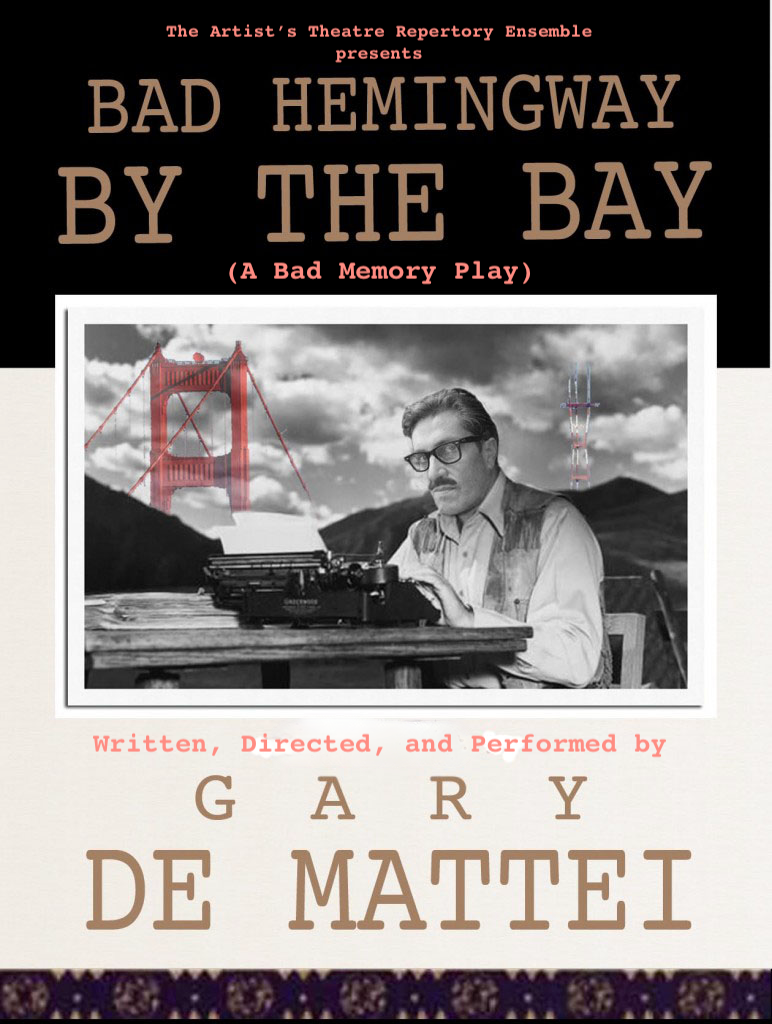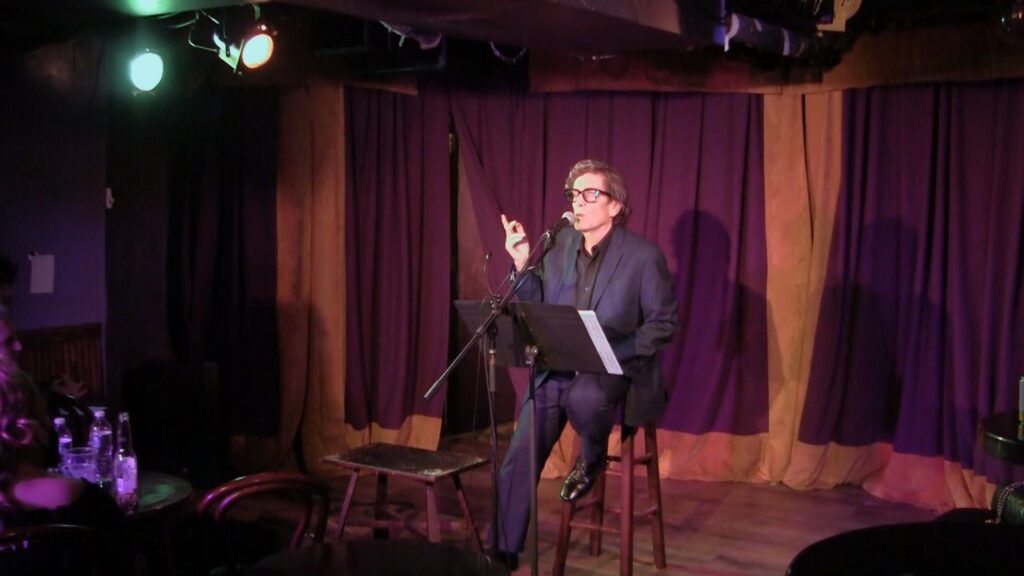
Summary in the manner of Bad Hemingway By The Bay by Gary De Mattei
The theme of Ernest Hemingway’s The Old Man and the Sea is, “A man can be destroyed but not defeated.” Bad Hemingway By The Bay (A Bad Memory Play), written, directed, and performed by Gary De Mattei, responds to this statement with the question, “You wanna bet?” De Mattei wrote his solo play in free-verse and while he tells his story playing twenty different characters he is accompanied by an ensemble of musicians underscoring the action with an original jazz score and sound effects. So, in essence, Bad Hemingway By The Bay is a solo performance piece…with other people.
The play is set in the mind of the storyteller, R.T. Dickman (Dick), an aging spirit in Limbo. Or is it Bardo? Or is it both? One thing is certain, Dick is a ghost who isn’t getting any younger so he haunts theatres telling his tale of murder and corruption and fifty-percent off sales at Wilkes Bashford hoping it will bring him closure after dying of a broken heart on a A Perfect Autumn Sunday in San Francisco during the California Cuisine hysteria started by Wolfgang Puck down in Los Angeles. Or was it, Alice Waters up in Berkeley? Or, was it both? One thing is certain, Bad Hemingway by the Bay is an absurdist tragi-comedy about a writer and performance artist who made his living in the restaurant business in order to fund his obsession to compose one really good page of really Bad Hemingway for submission to an annual Bad Hemingway contest. The winner gets their piece published on a billboard outside of Prego, a popular Florentine style trattoria on San Francsico’s famed Union Street. Prego is where Dick’s friend Pino is the bartender (Pino treats all of his customers like they are on the back of his Vespa riding down the Via Veneto saying, “Pino look out we’re all going to die!”). The winner of the Bad Hemingway Contest also receives an all expense paid trip for two to Harry’s Bar in Venice, a former Ernest Hemingway hangout where Hemingway drank Bellinis. Or was it, Martinis? Or was it both? One thing’s certain, when Dick was alive he earned his money as a restaurant manager whose many special talents included “stopping the bleeding”, a commonly used euphemism among first-time restaurant owners who’d spend millions of dollars renovating someone else’s building leaving no money in the bank for operating expenses during the precarious opening months. Henry David Thoreau’s is co-owned and operated by Dick’s best friend, a Michelin starred chef who Dick calls Gerard Depardieu (because of his striking resemblance to the famous French film star, and because…that was his name). The principal owners are twin brothers Henry and David Thoreau, (also known as Enrico and Vido Torro…in five states). Henry and David have never run a restaurant before (they’ve burned down plenty but never managed one) so, as a favor to Gerard (whose sous-chef wife just left him because she found him in the walk-in refrigerator with the Sommelier from the Fog City Diner. Or was it the Garde Manger from the Zuni Cafe? Or was it both? One thing’s certain, Gerard was French) Dick takes a meeting with Henry and David in an attempt to help his best friend stay out of the hole (and we don’t mean whole in the hole). At the meeting, Dick makes several recommendations on how to save Thoreau’s from closure. Henry and David decide not to kill Dick for putting red lines through their menu and instead they hire him to implement the changes (which includes writing a very campy floor show about Henry David Thoreau that Beach Blanket Babylon won’t sue them for because they won’t use any big hats). (The Walden Pond Revue). Over the next three years, Henry David Thoreau’s becomes the hottest “fun-theme restaurant” in town with plans for expansion. In addition to managing the bar at Thoreau’s in the evening, Dick is also the day bar manager of an underground nightclub South of Market Street (SOMA) known as Club Feat. Dick informs us that “bar manager” is just a fancy title for the day bartender. Dick works at the club by day doing the ordering and the stocking and the inventory and cleaning the vomit off the payphones and patching the holes punched in the bathroom walls by the guys who pump iron at Gold’s Gym (the ones who have the steroid shakes). Dick also performs his nightclub act at Club Feat After Hours. His act is a Bad Hemingway piece titled The Cold Man And The Sea (Now in its third coldest year!) Contrasted with Dick’s successful professional life is his disastrous personal life with his current lover, the brilliant visual artist La Ragazza who feels she is sullying her MFA in graphic design from Parsons working as the in-house calligraphist and illustrator for Jacques Print Shacques, the printing and publishing company of several underground newspapers that feature Dick’s column under the byline Bad Hemingway By The Bay. Jacques Print Shacques is down the street from Club Feat and is co-owned by San Francisco Opera Chorister, Accountant, and 49er faithful— Little John The Accountant. Jacques Print Shacques is also owned by publisher and trust fund baby Jacques (pronounced Jack). Jacques looks like Tom Cruise only he’s taller and slightly more annoying because he has a masters in comparative literature from Stanford. Jacques Print Shacques is being threatened by a new personal computing device whose main feature is desk top publishing but Jacques doesn’t want to touch his trust fund until he makes it on his own steam so he moonlights as a bartender at Tosca’s in North Beach. Jacques is a Luddite so he’s fine with paying La Ragazza a lot to do all of his illustrations and layout for him by hand for more than his doomed company can afford because she is the best, while also having Dick write column after column in Jacques’ various underground newspapers, which Dick gladly does for free. Dick and La Ragazza further complicate their dysfunctional relationship by attempting to procreate, but Dick “shoots blanks” which is why they both work two jobs — male infertility treatments are expensive and not covered under Dick’s Blockbuster card. When Dick was very young, he was sent to a Urologist (Dr. Krab with a K) and treated for male infertility before Dick knew how babies were made. After several years of treatment, Dr. Krab concluded that with a little more better living through chemistry Dick could one day be able to live a normal life with a wife and have children of his own to leave him alone because “it only takes one”. Throughout his adult life IT ONLY TAKES ONE were the words Dick clung to (and tattooed on his thigh) through failed relationship after failed relationship while also enduring painful treatments from a trio of infertility specialists (Vizzini, Hamlisch & Bowels) in the hope that one day he would produce that single sperm. To paraphrase Anton Chekhov, it was his work as a writer and a performance artist that gave him the ability to endure. Until it didn’t. To procreate or not to procreate? Is procreation even ethical? Does coming into existence do more harm than good to sentient beings? These are some of the questions Bad Hemingway By The Bay asks, but does not answer.

Photo: Gary De Mattei during the staged reading of Bad Hemingway By The Bay at New York’s Huron Club at the SOHO Playhouse (2023)